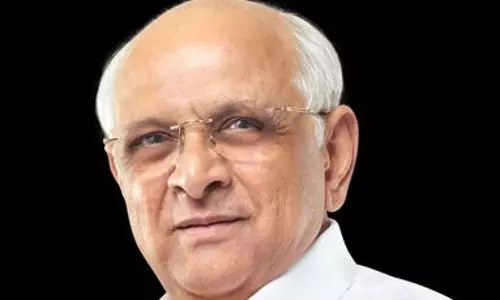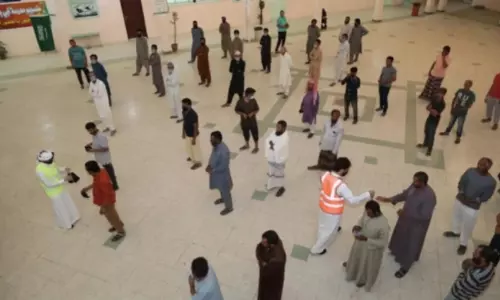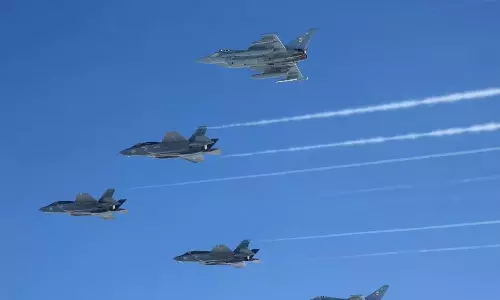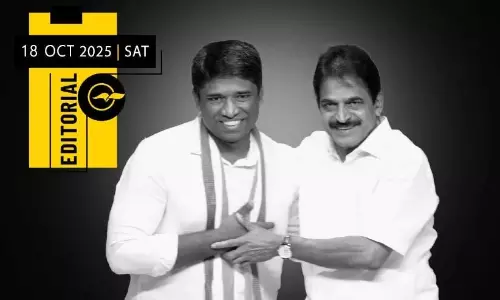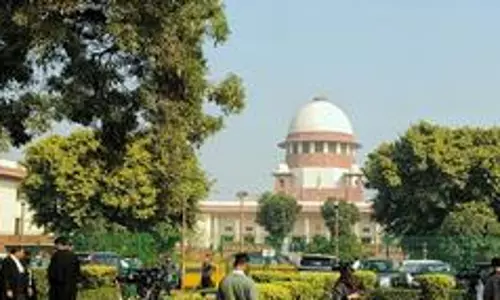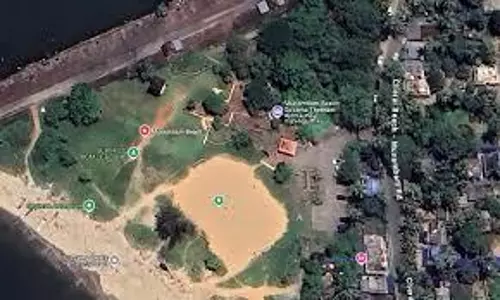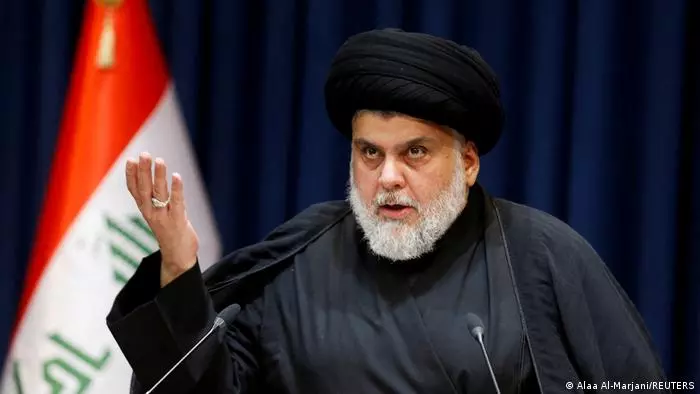
Iraq on the brink of an irreparable collapse!
text_fieldsMuqtada Al-Sard (file photo)
Iraq's political landscape appears foggy as the attempts by the political leaders failed to forge a major deal to put an end to the dilemma of forming a new government. Parliament Speaker Mohammad Al-Halbousi had earlier confirmed that talks were underway between Shia, Sunni and Kurdish parliamentary groups to form a national unity government . But, that did not materialize. In the election in October 2021, the party of the Shiite cleric Muqtada Al-Sadr emerged as the winner, with 73 out of the 329 seats, while two established Iran-backed Shia coalitions – the Fatah Alliance and the Al-Nasr Alliance – suffered major losses. After the election, Muqtada Al-Sadr's idea was to form a majority government in the shape of a triple alliance comprising his movement, the Sunni Taqaddum Coalition and the Kurdish KDP. The Shi'ite Coordination Framework, however, demanded the continuation of a unity government, of which it would form part.
The deadlock between Al-Sadr and his rivals has left Iraq without a government for a record time in the post-Saddam Hussein era. Outgoing Prime Minister Mustafa al-Kadhimi has called for a "national dialogue" in a bid to bring all sides together to talk, and he conveyed this to President Barham Saleh. Both men stressed the importance of "guaranteeing security and stability" to the country.
But, it was clear as Dorsa Jabbari ,the Al Jazeera correspondent said, that neither Al-Sadr, nor his representatives, participated "in any form of national dialogue". Earlier, the United Nations mission in Iraq appealed to the leaders of rival groups to consider their country first and end the long-running power struggle. "Meaningful dialogue among all Iraqi parties is now more urgent than ever, as recent events have demonstrated the rapid risk of escalation in this tense political climate," the UN mission warned. After they had failed to form a government, the Sadr party MPs resigned. This left the ball in the Coordination Framework's court.
However, Sadr's withdrawal from parliament was regarded as a strategic ploy in an effort to earn credibility as an outsider against a corrupt political elite, enabling it to mobilise popular protests. Against this background the biggest demonstrations since the mass protests of October 2019, as well as the parliamentary sit-ins were scarcely surprising.
The choice became between ruling the country or paralyzing its institutions because of its inability to join the "coordinating framework," most of whose parties are aligned with Tehran's interests. In the face of the forces allied and supporting the Shiites in Iran, Muqtada al-Sadr, and the forces that represent a coalition between the Taqdum Alliance (Muhammad al-Halbousi) and Kurdish Democratic Party ( Massoud Barzani), started the "Save the Homeland" campaign.
There was an option of forming a government in which Sadr and his allies could be parts of it, if it could accept the proposal of the Coordination Framework and obtain the support of 155 deputies (out of 329), but it would have deprived Muqtada al-Sadr of the freedom to make decisions and left him hostage in the hands of his actual opponent, former Prime Minister Nuri al-Maliki. So, representatives loyal to Sadr resigned from parliament in response to these complications. Al-Sadr believed that the resignations would prompt his opponents to pursue him in search of a settlement. But his opponents were more cunning. They took advantage of the resignations and placed the Shiite candidates whose rank came in the election results in second place in the place of the resigned deputies, who numbered 73, and thus the space was cleared for them in Parliament in a "constitutional" manner to do what they wanted . In the light of their control of the parliamentary majority, Muqtada al-Sadr was left with the option of resorting to the street campaign to press his claim. The decision to resign from Parliament was not the best decision taken by Muqtada al-Sadr, but it was consistent with the emotional approach with which he takes most of his decisions. According to Iraq's electoral law, Sadr knows when a member of parliament resigns, the electoral commission replaces him with the candidate placed second in the same electoral circle.
Today, Sadr demands the dissolution of Parliament - a demand that faces a good number of constitutional obstacles: the judiciary does not have the authority to dissolve it according to the constitution, and Prime Minister Mustafa Al-Kadhimi cannot ask the President of the Republic to dissolve Parliament because Al-Kazemi's powers do not allow him to do so. The parliament can dissolve itself . But, it will not. Because the "coordinating framework" has the majority in it now, after the resignation of Sadr's deputies. The "framework" is now defending its position under the pretext of "care for constitutional legitimacy and the rule of law", as this legitimacy serves its current interests. Nouri al-Maliki raises his voice, calling on parliament to reconvene and discuss all the demands, knowing that meeting this request represents a defeat for al-Sadr.
Hundreds of supporters of Muqtada al-Sadr mounted a sit-in at the headquarters of Iraq's Supreme Judicial Council to dramatize their demands for early elections to resolve the political deadlock. This protest forced the council and the Iraqi Supreme Court to suspend operations for a few hours. But, now, after a spokesman for Al-Sadr, Mohamed Saleh al-Iraqi urged the demonstrators to end their strike, they have suspended it.
There is no doubt that the Sadrist movement's victory in the election in October 2021 surprised everyone and frightened Iran and its proxies in Iraq. The movement led by Muqtada Al-Sadr ,not being accountable to Iran, was quite free to make decisions on his own. It is the opposite of all the Shia organisations with which it is clashing. Al-Sadr also clashed with the Americans after their invasion of his country, and put himself at a safe distance from Iran, unlike Nouri Al-Maliki's Coordination Framework which is subservient to Tehran and has obstructed the formation of a new government by keeping parliamentarians away from the sessions to choose the prime minister. No legal quorum has thus been possible so the vacuum persisted. This prompted Al-Sadr to announce his withdrawal from parliament. The Sadrist movement MPs resigned, and his supporters stormed the parliament building and held a protest sit-in. He called on his supporters to stage demonstrations across Iraq. Meanwhile, the Coordination Framework also sought to mobilise its supporters for anti-Sadrist demonstrations.
The confrontational stalemate, no doubt, ends in the paralysis of the country and an exit from it is very difficult. In the light of the opposition groups demonstrating in the vicinity of the Iraqi parliament, matters are heading for more difficult complications, especially due to the distribution of armed forces between the Sadrist movement and the "Popular Mobilization." So, resorting to street resolution becomes the most dangerous option. In the midst of this predicament, Prime Minister Mustafa Al-Kadhimi stands as a lone figure calling for wisdom and responsibility, under the slogan "A thousand years of dialogue is better than a moment of collision between Iraqis." A slogan that sounds like a cry in a valley after the conflicting interests at home and the Iranian pressures across the border control the decisions of the various forces that are fighting for power in Iraq.
Al-Maliki's Framework may lose more seats than it did last year if a new parliamentary election takes place. Hence, he is thinking of clinging to the current parliament. But, Muqtada Al-Sadr, in his efforts to boost Iraqi patriotism after nineteen years of US occupation and governments, tainted for corruption, sectarianism and criminality, is calling for the establishment of a new presidential system. The current stagnation and crises call for rational thinking in order to preserve civil peace and the interests of the people. The great dilemma facing all political forces in Iraq is that the country had failed to build state institutions after the 2003 US invasion ended. Today they are groping in darkness, being incapable of providing the least of what even the weakest countries offer to their citizens. We know from history that nations and civilisations are not built on empty theories and slogans that do not originate out of the reality of people's lives and suffering. It is the active people who believe in their cause and are willing to make every sacrifice by giving their lives and money as the price to pay for the victory of their principles. Hence, the people of Iraq must rely on themselves and understand their own importance and the vital role that they must play in order to achieve the desired change. Iraq has no hope of political change that comes through Iran or the US.
When the 2003 war started, the economy of Iraq was already in shambles, having gone through the eight-year war with Iran in the 1980s, the first Gulf War of 1990-91, and the UN-imposed financial and trade embargo after 1990. In the first year of the occupation, more than 70 American companies and individuals, (including Halliburton, Bechtel and Bearing Point) won reconstruction contracts, largely paid for from Iraqi funds. During the same period, it could be noted that Iraqi firms received just 2% of the value of contracts paid for from Iraqi funds. Financial Times reported that the top ten contractors between them secured business worth at least $72bn. Professor David Whyte of Liverpool University described the economic performance of the Coalition Provisional Authority as "one of the most audacious and spectacular crimes of theft in modern history". Now also, the plundering of the third world countries by the United States continues.. Parts of Iraq are now rubble, a ruin-monument to western folly.
One hundred military orders were signed into law by the US-backed Provisional Authority to privatize state-run companies and amend the tax laws to facilitate foreign ownership. In fact, the current sad state of Iraq's economy and institutions is the direct result of the devastating impact of imperialism and exploitation that continue to this date.
At the moment, Sadr's withdrawal certainly creates an opportunity for the Coordination Framework to form the government with an alliance of Sunnis and Kurds, which will provide enough members for the selection of the president and the prime minister and for forming the Cabinet. With the replacement of the Sadrist seats, they will get about 40 more seats at least, making them garner much more than the 220 required to select the president. But the differences between the Coordination Framework itself and the Sunni and Kurdish groups are very sharp, which could make it very difficult to unite to form the government. In the absence of compromise among the political blocs, Iraq will be on the brink of an irreparable collapse. Observers fear that the country is headed toward a civil war between Muqtada al-Sadr and his Iran-aligned rivals. The rivals feel emboldened by the silence of the 92-year-old Ali al-Sistani, a revered spiritual figure whose word holds enormous sway among leaders and ordinary Iraqis. Al-Sistani does have red lines that, if crossed, would compel him to intervene, the officials said. They include bloodshed and attempts to erode what are seen as Iraq's democratic foundations.
"Muqtada knows these red lines and will not cross them," that is what observers believe.






